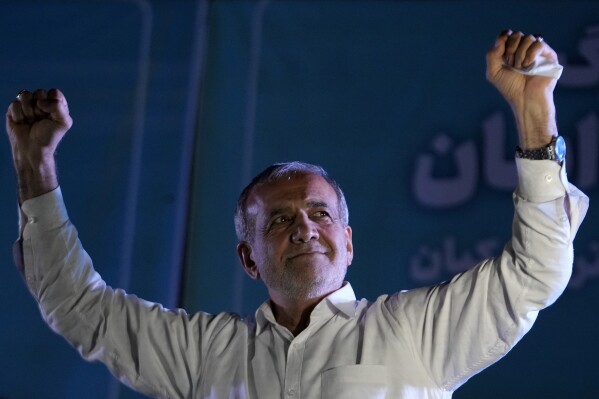
Masoud Pezeshkian elected as Iran's new president

Reformist Masoud Pezeshkian is Iran's new president. He is elected with 53.3 percent of the vote out of more than 30 million votes, defeating his hardline conservative rival Saeed Jalili. Jalili received 44.3 percent of the vote. BBC reported.
In the first round of the June 28 election, no candidate secured more than 50 percent of the vote. Only 40 percent of the country's voters participated in the first round of voting.According to the report, voter turnout in the second phase of voting held on Friday was higher than in the first phase last week. Some voters who did not vote in the first round agreed to vote for Pezeshkian this time. Because they did not want to see the hardline Jalili as the next president of Iran.
They feared that if Jalili wins, Iran would move towards more confrontation with the outside world. He can offer the country nothing but sanctions.
Pezeshkian, 69, was up against Saeed Jalili, 58, a hard-liner who is a former negotiator with the West over Iran's contentious nuclear program.
The run-off election in Iran were held to choose a successor to late President Ebrahim Raisi, who was killed in a helicopter crash in May along with the foreign minister and other officials.
Pezeshkian, a heart surgeon and reformist politician, was health minister from 2001 to 2005.
Turnout higher than first round
According to authorities, Pezeshkian won Friday's election with 16.3 million votes, while Jalili got 13.5 million votes.
Initial reports from authorities indicated a turnout of around 50%, higher than in the first round.
There are some 60,000 polling stations and more than 61 million eligible voters in Iran amid a population of 85 million.
Low-stakes election
While neither man was expected to bring big changes to Iran's domestic or foreign policies if he won, with the main power resting in the hands of the country's Supreme Leader Ayatollah Ali Khamenei, the Iranian president will play a role in selecting the latter's successor.
Analysts say, however, that a win by Jalili, who has often voiced his hostility toward the West, would have brought an even more antagonistic domestic and foreign policy on the part of Tehran.
They say that Pezeshkian, who won some 10% more votes than Jalili in the first round, might advocate a milder foreign policy, be more open to reviving negotiations with major powers to restore the nuclear pact and be more liberal in his approach to social issues such as the mandatory wearing of headscarfs by women.
Pezeshkian maintained that he has always regarded Khamenei as the ultimate authority on all state matters in the country. During his campaign, Pezeshkian promised not to implement any radical changes to Iran's Shiite theocracy.
Editor & Publisher: S. M. Mesbah Uddin
Published by the Editor from House-45,
Road-3, Section-12, Pallabi, Mirpur
Dhaka-1216, Bangladesh
Call: +01713180024 & 0167 538 3357
News & Commercial Office :
Phone: 096 9612 7234 & 096 1175 5298
e-mail: financialpostbd@gmail.com
HAC & Marketing (Advertisement)
Call: 01616 521 297
e-mail: tdfpad@gmail.com